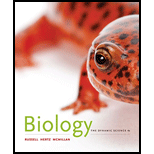
Concept explainers
Introduction:
The transport mechanisms in plants can be long-distance transport and short-distance transport. The long-distance transport is facilitated via vascular tissues throughout the plant body, while short-distance transport moves the substances into and across cells. There are three mechanisms that are responsible for the short-distance transport.
Answer to Problem 1TYK
Correct answer:
Short-distance transport mechanisms in plants move water and dissolved materials by osmosis.
Explanation of Solution
Justification for the correct answer:
Option (a) is “short-distance transport mechanisms include the movement of water and dissolved materials by osmosis.” Osmosis is the mechanism that is responsible for the short-distance transport. Osmosis is a process responsible for the movement of substances across cells due to concentration gradient. Hence, option (a) is the correct answer.
Explanation for incorrect answer:
Option (b) is “short-distance transport mechanisms include bulk flow of solutes and water.” Bulk flow is driven by pressure gradients that occur through the long-distance transport mechanism that uses vascular tissues like xylem and phloem. So, it is an incorrect option.
Option (c) is “short-distance transport mechanisms are not affected by the size of the molecules that have to be transported.” Short-distance transport mechanism is responsible for the movement of substances across the selectively permeable membranes according to concentration gradient. Size of the substance matters because only a certain size can be passed through the membrane pores or transporters. So, it is an incorrect option.
Option (d) is “short-distance transport mechanisms are not affected by the charge of molecules that have to be transported.” Short-distance transport mechanisms are accomplished via osmosis. It is a process that moves the substances across a semipermeable membrane. There are many factors that affect the rate of osmosis, the permeability of membrane being one of them. The permeability of membrane is determined by the charge of the solute. So, it is an incorrect option.
Hence, options (b), (c), and (d) are incorrect.
Therefore, short-distance transport mechanism moves water and other dissolved solutes into and across cells via osmosis.
Want to see more full solutions like this?
Chapter 34 Solutions
Biology: The Dynamic Science (MindTap Course List)
- 22. Which of the following mutant proteins is expected to have a dominant negative effect when over- expressed in normal cells? a. mutant PI3-kinase that lacks the SH2 domain but retains the kinase function b. mutant Grb2 protein that cannot bind to RTK c. mutant RTK that lacks the extracellular domain d. mutant PDK that has the PH domain but lost the kinase function e. all of the abovearrow_forwardWhat is the label ?arrow_forwardCan you described the image? Can you explain the question as well their answer and how to get to an answer to an problem like this?arrow_forward
- Describe the principle of homeostasis.arrow_forwardExplain how the hormones of the glands listed below travel around the body to target organs and tissues : Pituitary gland Hypothalamus Thyroid Parathyroid Adrenal Pineal Pancreas(islets of langerhans) Gonads (testes and ovaries) Placentaarrow_forwardWhat are the functions of the hormones produced in the glands listed below: Pituitary gland Hypothalamus Thyroid Parathyroid Adrenal Pineal Pancreas(islets of langerhans) Gonads (testes and ovaries) Placentaarrow_forward
 Biology: The Dynamic Science (MindTap Course List)BiologyISBN:9781305389892Author:Peter J. Russell, Paul E. Hertz, Beverly McMillanPublisher:Cengage Learning
Biology: The Dynamic Science (MindTap Course List)BiologyISBN:9781305389892Author:Peter J. Russell, Paul E. Hertz, Beverly McMillanPublisher:Cengage Learning Biology (MindTap Course List)BiologyISBN:9781337392938Author:Eldra Solomon, Charles Martin, Diana W. Martin, Linda R. BergPublisher:Cengage Learning
Biology (MindTap Course List)BiologyISBN:9781337392938Author:Eldra Solomon, Charles Martin, Diana W. Martin, Linda R. BergPublisher:Cengage Learning Concepts of BiologyBiologyISBN:9781938168116Author:Samantha Fowler, Rebecca Roush, James WisePublisher:OpenStax College
Concepts of BiologyBiologyISBN:9781938168116Author:Samantha Fowler, Rebecca Roush, James WisePublisher:OpenStax College- Basic Clinical Lab Competencies for Respiratory C...NursingISBN:9781285244662Author:WhitePublisher:Cengage

 Biology 2eBiologyISBN:9781947172517Author:Matthew Douglas, Jung Choi, Mary Ann ClarkPublisher:OpenStax
Biology 2eBiologyISBN:9781947172517Author:Matthew Douglas, Jung Choi, Mary Ann ClarkPublisher:OpenStax





